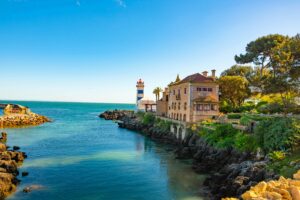On the use of American retirement funds to access Portugal's Golden Visa in 2025
DISCLAIMER: this video is for informational purposes only and does not constitute tax, financial, legal or any other form of advice. Neither Holborn nor Jonathan Ralph offer services relating to 401(k), IRA or other US-based retirement accounts. This video has been produced with the intention of addressing a topic that is frequently requested during 1:1 meetings with prospective Golden Visa investors, and serves as a reminder to ensure you take responsibility for your affairs and perform appropriate due diligence regarding your compliance with the Law.
Introduction
If you’re a U.S. citizen considering a move to Portugal through the Golden Visa program, you may be wondering how to access the required €500,000 investment. For many American high-net-worth individuals, a significant portion of their wealth is held in retirement accounts like 401(k)s and IRAs. However, tapping into these funds before retirement age typically triggers substantial tax penalties in the United States. I am frequently asked if there is a way to use your retirement savings for a Golden Visa investment—without incurring those penalties.
In this video, Jonathan breaks down the key considerations regarding the Portugal’s Golden Visa program for American investors. He examines both U.S. and Portuguese regulations and outlines a commonly proposed structure designed to remain compliant while avoiding early withdrawal penalties. We’ll also run through example calculations to illustrate potential tax savings and the long-term effects on your retirement plans and future lifestyle. The Portugal Golden Visa remains the leading pathway to dual citizenship and a European passport—without requiring you to relocate. By making a qualifying investment, maintaining it for five years, and spending an average of just seven days per year in Portugal, you could become eligible for European citizenship. This would open the door for you and your family to live, work, study, or retire anywhere within the European Union. For tailored guidance on your own situation (reminder: we do not offer 401(k) or IRA consultancy services), I recommend booking a free consultation using the link below.
Further information can be provided via a free consultation.
Now, onwards with today’s subject: using American retirement funds to access Portugal’s Golden Visa!

Understanding the Portugal Golden Visa
Welcome to this in-depth guide on the Portugal Golden Visa, where we explore a pressing question for many American investors: is it possible to use retirement funds, such as a 401(k) or IRA, to access the Golden Visa programme? And if so, is it worth it?
Before diving into the specifics, it is important to clarify that this information is provided strictly for educational purposes. It is not tax advice, financial advice, or legal advice of any kind. The goal is to shed light on a complex issue that many investors face and to outline potential pathways based on current rules and industry knowledge.
Let us begin with a brief overview of the Portugal Golden Visa itself. Introduced in 2012, the programme has gained considerable popularity as it offers one of the most straightforward routes to acquiring a European passport. This passport grants you the right to live, work, study, and retire anywhere in the European Union, not just in Portugal.
Mechanics of the Portugal Golden Visa
The Golden Visa is essentially a residence-by-investment scheme. In exchange for an investment—typically €500,000—into the Portuguese economy, investors receive a residence permit. After five years from the date of application (which usually falls slightly after the date of investment), and by spending at least seven days per year in Portugal, investors can apply for full citizenship. This process has already attracted over 10,000 applications, representing close to 30,000 individuals, and continues to grow each year.
Importantly, the programme allows for family inclusion. Dependent children and parents can be added to the application, although siblings are generally excluded unless legal guardianship exists. A clean criminal record is also required for all applicants.
The citizenship pathway is fully legal and does not require the investor to become a tax resident in Portugal. Citizenship has already been granted to numerous Golden Visa holders who have met the residency requirements without ever residing full-time in the country.
2025 Golden Visa Rules: What Still Qualifies
For those considering the Golden Visa in 2025, it is important to note recent rule changes. Real estate no longer qualifies as an investment route, as of October 2023. The capital transfer option has also been removed. The remaining qualifying routes include:
-
A €500,000 investment into a qualifying fund
-
A €500,000 investment into a Portuguese business
-
A €500,000 donation to scientific research
-
A €250,000 donation to cultural or artistic activities
-
Establishing a Portuguese company that employs at least ten people
In practice, most discussions about using retirement accounts centre on fund investments, as the other routes are more complex and less commonly attempted using such structures.
To qualify, investment funds must meet the following criteria:
-
They must not invest in real estate
-
They must be regulated by the Portuguese Securities Market Commission (CMVM)
-
At least 60 percent of their assets must be invested in Portuguese securities
In addition, the investment must be made by the individual or by a company that is 100 percent owned by the investor, according to Portuguese law. This last requirement will be particularly relevant as we examine how retirement funds might be used.
The Challenge for US Investors: Retirement Funds and Tax Penalties
Many high-net-worth American investors have the majority of their capital locked away in retirement accounts such as 401(k)s and IRAs. These accounts are subject to strict regulations, particularly when it comes to early withdrawals. Accessing funds before the age of 59½ usually incurs a 10 percent additional tax, on top of regular income tax. With the highest US tax bracket currently at 37 percent, early withdrawals could result in a total tax liability of up to 47 percent.
This is particularly problematic for investors under 60 who want to use their funds to secure a Golden Visa now, with the intention of retiring in Europe after gaining citizenship in five to fifteen years. It creates a paradox: they want to use retirement funds to qualify for a visa that will allow them to retire abroad, but accessing those funds before retirement triggers a significant tax burden.
There is also the broader financial consideration. It is generally more tax-efficient to withdraw retirement funds after stopping work, as income levels—and therefore tax rates—tend to be lower.

Case Study: John’s Golden Visa Dilemma
To illustrate the impact, let us consider a fictional example. John is 55 years old and earns $250,000 annually. He is in the 35 percent tax bracket and has an IRA worth $1.1 million, equivalent to €1 million. His goal is to obtain the Portugal Golden Visa as a pathway to eventual retirement in Europe.
Scenario One: Direct Investment from IRA (Without Withdrawal)
In an ideal world, John could use €500,000 directly from his IRA for the Golden Visa investment while leaving the remaining €500,000 in the IRA to grow at an assumed 6 percent annual return. After seven years, his Golden Visa investment remains intact and his IRA grows to €752,000. In total, he holds €1.25 million in retirement assets, not including potential returns from the Golden Visa investment itself.
Scenario Two: Early Withdrawal and Tax Penalties
If John withdraws €909,000 from his IRA to access €500,000 after tax, he incurs a 45 percent combined tax liability. This leaves him with only €91,000 remaining in the account. Using the same 6 percent growth assumption, this grows to just €137,000 over seven years. Combined with the Golden Visa investment, his total retirement assets stand at €637,000.
In simple terms, the difference between the two scenarios is €615,000, or about $660,000. The numbers show a compelling reason to find a tax-efficient way to use retirement funds for Golden Visa investment.
Is There a Way Around the Tax Hit?
So, is it possible to use retirement funds for a Golden Visa investment without incurring early withdrawal penalties? Based on current rules, we know two key facts:
-
US investors under 59½ generally want to avoid withdrawing funds from retirement accounts due to steep tax implications.
-
Portugal only allows Golden Visa investments to be made using personal funds or through a company that is entirely owned by the investor.
This combination of rules suggests a potential workaround: a company structure. A commonly proposed strategy involves the following steps:
-
The investor rolls their 401(k) or IRA into a self-directed version of the same account type.
-
This self-directed account can then invest in a US-based LLC owned by the retirement account.
-
The LLC, serving as the investment vehicle, then sets up a wholly owned Portuguese company.
-
The Portuguese company opens a local corporate bank account and makes the qualifying investment.
This chain of structures theoretically meets both sets of requirements: the funds remain within a retirement account, while the end investment is made by a Portuguese company that is fully owned—albeit indirectly—by the investor.
The same process may also be replicable with a self-directed Roth IRA, though there are important distinctions and tax implications that make it a separate discussion.

Final Considerations: Is It Worth Using Retirement Funds for a Portugal Golden Visa?
While the potential tax savings of using retirement accounts for a Portugal Golden Visa investment may be significant—as highlighted in the case of John—the strategy is far from straightforward. For those using Roth IRAs or other post-tax retirement accounts, the benefits tend to be much less compelling, since you’re dealing with funds that have already been taxed. The advantages simply do not scale in the same way.
It is essential that any such structure be implemented fully in line with both U.S. and Portuguese laws. As mentioned earlier, this article is purely for educational purposes. It does not constitute legal, financial, or tax advice. The complexity of international tax compliance requires expert guidance, and pursuing this approach without proper oversight carries serious risk.
If you are seriously considering this route, it is critical to consult with professionals who specialise in these matters. While our team at Holborn Assets does not offer structural setup services, we can refer you to legal experts—both in the U.S. and Portugal—who have handled such cases and may be able to assist.
Cost-Benefit Analysis: Weighing the Pros and Cons
So, is this structure worth pursuing? That depends on your personal circumstances. The potential tax savings can amount to hundreds of thousands of dollars in some cases, which makes it worth considering from a long-term retirement planning perspective.
However, there are important costs and risks involved:
-
Legal and Professional Fees: You will need legal assistance in both countries. Over the course of the investment, the total cost can range between €30,000 and €40,000.
-
Time and Administrative Burden: Setting up the structure correctly takes time. You will also need to maintain separate bank accounts for yourself and for the Portuguese company.
-
Compliance Risks: U.S. tax law is complex and enforcement is strict. You must ensure full legal compliance on both sides of the Atlantic.
-
Investment Limitations: These structures are generally only compatible with fund-based Golden Visa routes. That limits your options compared to direct investments into businesses or other qualifying categories.
-
Regulatory Uncertainty: This remains a relatively new and evolving strategy. While current laws allow for such setups, tax regulations can change. Anyone pursuing this path must remain vigilant to stay compliant over time.
In short, while the opportunity is real, so are the responsibilities and risks. Make sure you understand them fully before proceeding.
Summary: Proceed with Caution and the Right Advice
Using retirement funds to obtain a Portugal Golden Visa may offer a transformative opportunity—especially if approached with proper structure and guidance. The tax savings potential alone can be substantial. However, this is not a DIY strategy. It is essential to work with qualified advisors who understand both the U.S. and Portuguese legal systems, and who can guide you through the process compliantly.
This blog post has aimed to cut through the misinformation currently circulating online and present the facts as clearly as possible. While we cannot provide legal or structural services ourselves, we can help point you in the right direction if you are considering this path.
Are you looking to apply for your own Portugal Golden Visa in 2025?
For a free personal review, click the button below for a consultation with a Residency & Citizenship by Investment specialist.

